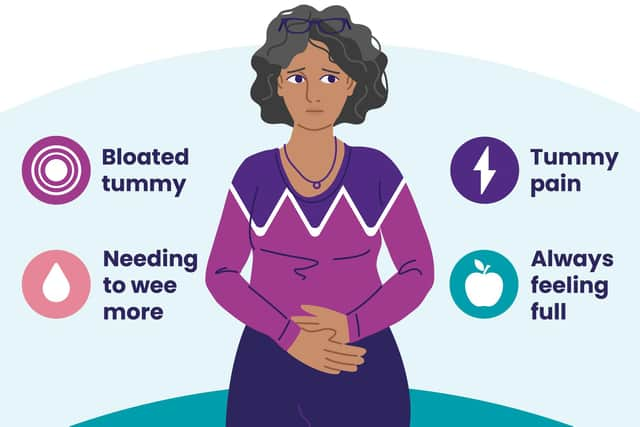Four symptoms every woman should know to target ovarian cancer
and live on Freeview channel 276
The charity is using Ovarian Cancer Awareness Month this March to raise awareness.
According to the charity, four in ten women commonly believe that cervical screening can detect ovarian cancer which it does not.
Advertisement
Hide AdAdvertisement
Hide AdAnd the symptoms of ovarian cancer – persistent bloating, abdominal pain, needing to wee more often and feeling full quickly – continue to be put down to other conditions such as the menopause or IBS.


Ovarian cancer is the sixth most common cause of cancer deaths amongst women in the UK and more needs to be done to ensure women are diagnosed early to save lives. Awareness and understanding of the symptoms is imperative to this.
Helen Dickens, Target Ovarian Cancer deputy chief executive, said: “Although progress has been made over the years, we need to see it accelerated.
“A woman diagnosed at the earliest possible opportunity has a better chance of surviving this devastating disease.
Advertisement
Hide AdAdvertisement
Hide Ad“March is Ovarian Cancer Awareness Month and we want to empower women to get help quickly if they’re concerned. It starts with knowing the main symptoms – persistent bloating, abdominal pain, needing to wee more often and feeling full quickly.”


Research by Target Ovarian Cancer shows awareness of the disease remains concerningly low and misconceptions prevail. This can lead to a delayed diagnosis, when the disease is harder to treat.
Dr Sharon Tate, Target Ovarian Cancer head of primary care engagement, said: “We need to be clear that ovarian cancer can be caught early, if the knowledge is there.”
Five things you need to know: There are symptoms; cervical screening does not detect ovarian cancer; you can have ovarian cancer at any age but post-menopausal women and those over 50 are at a higher risk; you can get ovarian cancer even if you’ve had a hysterectomy and hereditary ovarian cancer is not only passed down the maternal line – you could be at high risk if you have two or more cases of breast and/or ovarian cancer in your family history.
To find out more, visit targetovariancancer.org.uk.